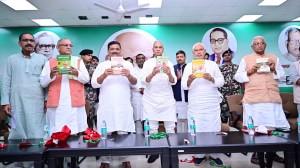This farmer wanted a motorbike
Vidarbha's serious agrarian crisis has been one of the most agonising media stories of recent times.

Vidarbha’s serious agrarian crisis has been one of the most agonising media stories of recent times. It was this newspaper which first brought the crisis to the fore on November 19, 2002 by reporting the suicides of nine farmers in Yavatmal district within six weeks. Since then it has been consistently reporting on the issue. Media attention has, in turn, prodded the government into action. First came the Rs 1,076 crore package from the state government in December 2005. Later, Prime Minister Manmohan Singh visited the region in July 2006 and announced a Rs 3,770-crore package.
Suicides continued to figure and there were even reports that their number had actually gone up after the PM’s package was announced. Most of these reports were based on e-mails and press notes issued by Vidarbha Jan Andolan Samiti, which claimed to be keeping tabs on all the farmers’ suicides in the region. As a paper, however, the Express chose not to publish them because there were doubts about their authenticity. Others kept reporting the figures without bothering to verify them.
The fact is that the number of agrarian suicides has been coming down of late, largely because of the initiatives announced by the PM in the six worst-affected cotton districts of the region. Steps ranging from the waiver of interest worth more than Rs 700 crore to a crackdown on private money-lenders, taken together, have had an impact. Therefore the claim many in the media continue to make that farmers are still committing suicide in large numbers due to indebtedness, doesn’t hold water. Take one such story. It was about a young farmer committing suicide in the bank where he was standing in a queue to receive a fresh crop loan. The suicide was committed reportedly because actual disbursal of payment had got delayed by a few hours. Investigation by this newspaper revealed that the young man was pestering his father to give him the loan money in order to buy a motorcycle. When the father refused to do so, the son consumed poison right in front of the bank. Vested interests sold the story to the media as a farmer’s suicide and the media blindly published it prominently.
Farmers’ suicides have by no means ended, of course, and they still remain cause for concern. But, as we have just reported in The Sunday Express (August 26), their numbers are declining. Does this mean the media should not report suicides at all? Ideally no, unless they have been personally verified and only if the story throws new light on the crisis. We also need to understand that the number of suicides cannot be the real index of the severity of the crisis. If that were so, then the question arises as to why just 8,000 out of the nearly 18 lakh farmers in the six worst-affected districts had committed suicide since 2001, when a state government’s survey last year found that 4.5 lakh farmers were acutely distressed? Does this mean that the remaining 95 per cent of these 4.5 lakh are agriculturally less distressed? Also to be noted is the fact that only 50 per cent of these suicides belong to the acutely distressed category. The rest belong to the moderately distressed (9 lakh) and non-distressed (3.75 lakh) categories.
Clearly, then, there are reasons other than agrarian ones that trigger suicides. Many farmers end up spending a lot on health care. There are also exacerbating factors like domestic quarrels and indebtedness due to alcoholism. According to a study conducted by the Indira Gandhi Institute for Development Research, while health-related problems were reported in 21 per cent cases, a non-responsive family set-up as well as addictions accounted for 55 and 28 per cent of suicides respectively. Which means that these farmers wouldn’t have committed suicide if they did not have to contend with the additional aggravations although it does not mean that they were not distressed for agricultural reasons.
This is not to deny that media reporting farmers’ suicides has not served an important purpose. It has woken up a highly urban-centric government to the rural economic crisis. A beginning has been made. Since we have necessarily to depend on the government to address the situation, let us not unduly harass it for the wrong reasons. Let’s hold it accountable for the right ones.
In fact, the interests of farmers would be best served by focusing on the real problems dogging them rather than by highlighting unsubstantiated stories of suicide.



- 01
- 02
- 03
- 04
- 05




























